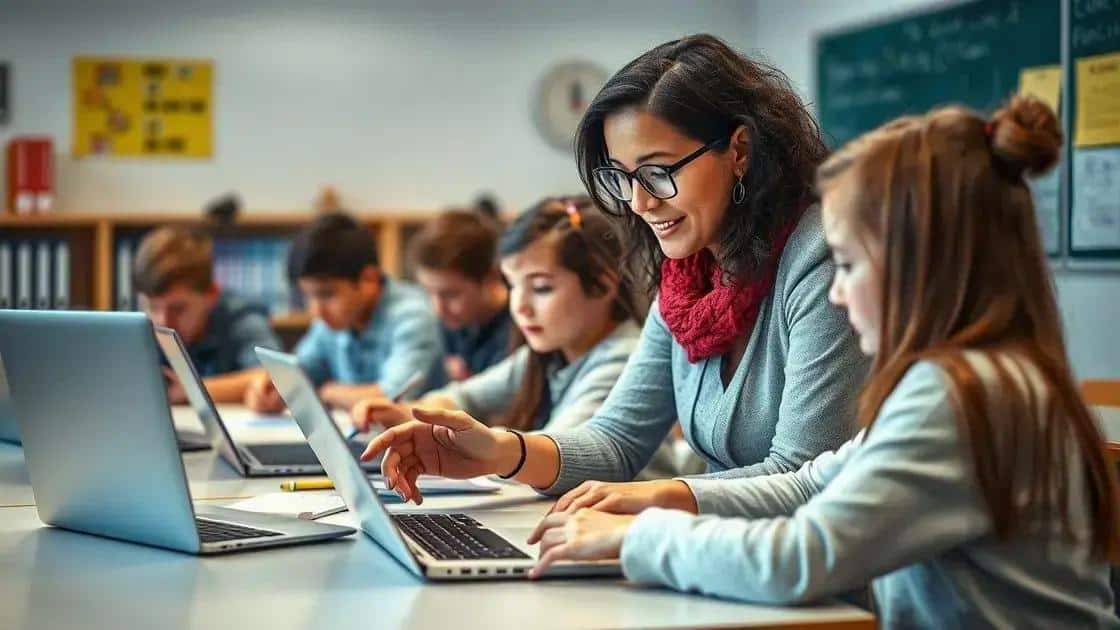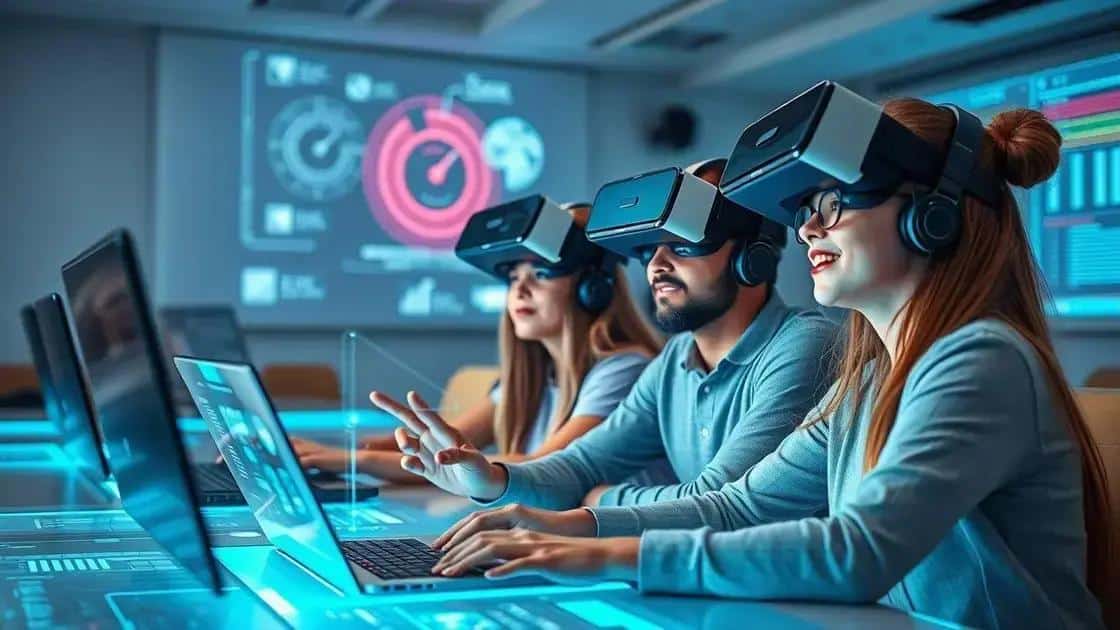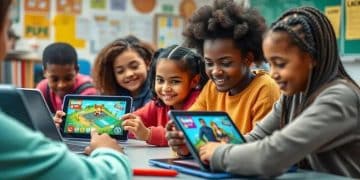Insights on online course trends: what to expect

Insights on online course trends reveal that technology, including AI and immersive tools, is transforming education by making it more personalized, accessible, and engaging for diverse learners.
When we talk about insights on online course trends, there’s so much to unpack. With rapid advancements in technology and shifts in learner preferences, it’s crucial to understand how these factors shape education today. Ready to dive in?
Emerging trends in online learning
As we explore emerging trends in online learning, it’s vital to understand how technology is driving changes in education. Online learning isn’t just growing; it’s evolving with innovative methods that enhance engagement and retention.
Blended Learning Models
One trend gaining traction is the blended learning model. This approach combines traditional face-to-face education with online components. Students benefit from flexible learning opportunities while still having access to direct instructor support.
- Flexible scheduling allows for personal pacing.
- Increased interaction through discussion boards.
- Access to a wide array of resources beyond textbooks.
Another notable trend is the rise of microlearning, which focuses on delivering content in small, bite-sized modules. This style is effective for learners who may feel overwhelmed by lengthy courses. By breaking down information, students can absorb material more effectively and at a more manageable pace.
Personalized Learning Experiences
Personalization is also at the forefront of new online learning methods. Through analytics and AI, educators can tailor curriculums to meet individual student needs. This can lead to higher engagement and success rates, as the learning experience becomes more relevant to each student.
Additionally, we see a significant shift towards mobile learning. With more students accessing courses via smartphones and tablets, it’s crucial for educational content to be optimized for mobile use. This flexibility allows learners to study anytime and anywhere, making education more accessible than ever.
- Mobile apps enhance the on-the-go learning experience.
- Interactive quizzes and assignments can boost motivation.
- Social media integration encourages collaboration.
These trends not only make learning more effective but also more enjoyable. As educational institutions adopt these innovations, they prepare to meet the evolving demands of learners in a digital world. Keeping an eye on these developments will help both educators and students navigate the future of learning.
The role of technology in course delivery

Understanding the role of technology in course delivery is essential in today’s educational landscape. Technology enhances how course materials are shared and accessed, providing students with a more engaging learning experience.
Adaptive Learning Platforms
One significant trend is the use of adaptive learning platforms. These systems adjust content and assessments based on each student’s performance. This means that learners receive personalized support, making it easier to grasp complex concepts.
- Real-time feedback helps students improve.
- Content changes based on student needs and pace.
- Promotes a more tailored educational experience.
Another important aspect is the integration of multimedia resources. By using videos, podcasts, and interactive simulations, instructors can appeal to different learning styles. This multimedia approach keeps students engaged and makes learning more enjoyable.
Learning Management Systems (LMS)
Learning Management Systems play a crucial part in this process. LMS platforms allow educators to easily organize courses, track progress, and communicate with students. These systems streamline course delivery and help maintain a structured learning environment.
Additionally, many LMSs now feature gamification elements. By incorporating game-like features, such as leaderboards and rewards, students feel motivated to participate actively. This interactive approach reinforces learning while making it fun.
- Gamification increases student motivation.
- Interactive quizzes and challenges engage learners.
- Feedback loops improve understanding.
Overall, technology continuously transforms how courses are delivered. Educators can utilize various tools and platforms to enhance learning experiences, making education more effective and accessible.
Student engagement strategies for success
Effective student engagement strategies for success are vital for promoting active learning and improving academic outcomes. Engaging students creates a dynamic environment and fosters a love for learning.
Interactive Learning Activities
One effective method is incorporating interactive learning activities. These can include group discussions, hands-on projects, and role-playing exercises. By participating actively, students are more likely to retain information and develop critical thinking skills.
- Group projects enhance collaboration with peers.
- Role-playing scenarios deepen understanding of concepts.
- Interactive quizzes provide immediate feedback.
Another strategy is utilizing technology to create engaging experiences. Online tools and platforms can facilitate interactive lessons. For instance, using live polls and quizzes during a lecture allows students to remain involved and share their thoughts.
Personal Connection with Students
Building personal connections with students also boosts engagement. When educators take the time to understand their students’ interests, they can tailor lessons to be more relevant and impactful. This connection encourages students to participate and express themselves freely.
Moreover, providing choices in assignments fosters autonomy. When students have the opportunity to select topics that resonate with them, they are more motivated to invest time and effort in their work. This sense of ownership can lead to a deeper understanding of the subject matter.
- Choice in assignments promotes student independence.
- Understanding student interests leads to more tailored lessons.
- Fostering a supportive classroom environment encourages participation.
Ultimately, implementing various engagement strategies not only enhances learning experiences but also helps students feel valued. An engaging classroom sets the foundation for ongoing academic success.
Future predictions in online education

Future predictions in online education indicate significant changes that will shape how learners interact with content. As technology advances, education is evolving, making it more accessible and engaging for everyone.
Increased Use of Artificial Intelligence
One important trend is the increased use of artificial intelligence (AI) in education. AI can personalize learning experiences by analyzing student data. This allows for tailored content that meets each student’s unique needs, enhancing the overall learning process.
- AI can identify learning gaps and recommend resources.
- Personalized tutoring systems may emerge for additional support.
- Automated grading systems will save time for instructors.
Additionally, we will see more immersive technologies, such as virtual reality (VR) and augmented reality (AR), becoming commonplace. These technologies will provide students with hands-on experiences in a virtual environment, making concepts easier to understand.
Growth of Remote Learning
Remote learning is also expected to expand significantly. More institutions will offer online courses that are flexible and accessible. This growth will allow students from various backgrounds to pursue education without geographical limitations.
With increased collaboration tools, students will be able to work together in real-time, regardless of location. This collaborative approach will foster a sense of community among learners, even when they are not physically together.
- Collaboration tools enhance teamwork in projects.
- Flexible scheduling will allow learners to balance study and personal commitments.
- Access to a global classroom enriches cultural exchange.
As we look to the future, integrating these advanced technologies and strategies will be crucial. The changes will not only improve how education is delivered but also ensure that it remains relevant in a rapidly changing world.
In conclusion, the future of online education is set to be shaped by exciting advancements in technology and innovative teaching strategies. By embracing artificial intelligence and immersive tools like virtual reality, education will become more personalized and engaging. The growth of remote learning will also break down barriers, allowing students from all backgrounds to access quality education. The ongoing evolution of how we deliver knowledge will ensure that learning remains relevant and impactful in our changing world. Let’s look forward to these changes and the opportunities they bring!
\n
\n
FAQ – Frequently Asked Questions about Online Education Trends
What role does technology play in online education?
Technology enhances course delivery by providing interactive tools and personalized learning experiences, making education more accessible and engaging.
How will artificial intelligence impact future learning?
AI will enable personalized learning by analyzing student progress and adapting content to meet individual needs, improving educational outcomes.
What are some effective strategies for student engagement?
Effective strategies include interactive learning activities, the use of technology for real-time feedback, and building personal connections with students.
How can remote learning be made more effective?
Remote learning can be made effective by integrating collaborative tools, offering flexible scheduling, and creating an inclusive online learning environment.






